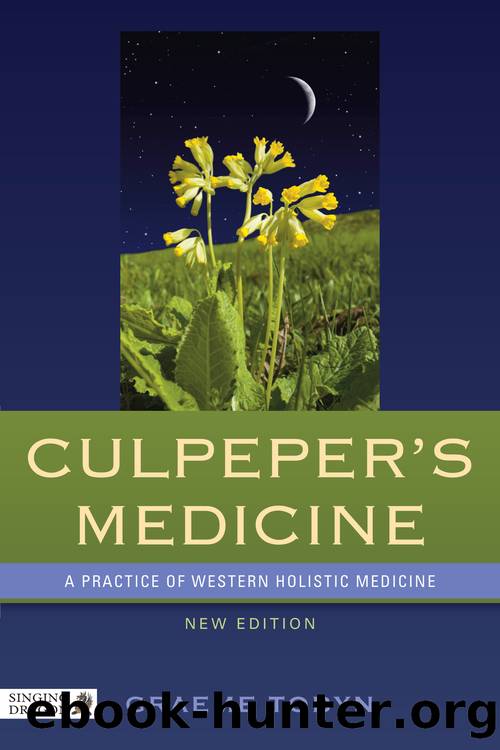Culpeper's Medicine by Tobyn Graeme

Author:Tobyn, Graeme. [Graeme Tobyn]
Language: eng
Format: epub
ISBN: 9780857010988
Publisher: Element Books Ltd.
Published: 2013-07-09T16:00:00+00:00
Exercise and rest
Moderate exercise, Culpeper says, stirs up the natural heat by which digestion is improved, and equally distributes the spirits of the body.45 It opens the pores to let the waste products of the third concoction escape, an important, cleansing transpiration through the skin, and helps rid the body of other waste through the lungs. Exercise generally strengthens the physique and comforts the body, senses and spirits. It is ‘a principal means for preserving health, above all other things except temperance’. Hippocrates said that the way to preserve health is not to glut the stomach with food and to be laborious in exercise. Aristotle explained the reason why this is so, that ‘the superfluity of humours causeth diseases, which show themselves chiefly when either a man exceeds in diet or is wanting in exercise’. Galen even suggested that, provided a person exercises regularly, the occasional excess in diet will do no harm.46
Excessive exercise, on the other hand, hurts by its drying and wearying effect on the body and spirits, and can disturb normal functioning. In the same way rest, as a necessary corollary to exercise, also strengthens the body and maintains good health, but excessive rest, or idleness, is bad for the body. For rest activates the phlegmatic humour, as exercise sets in motion the blood and the choleric and melancholic humours. Excessive resting brings the effects of excessive phlegm in the body: a dullness of the mind and senses and the production of crude humours in the body through diminished digestive power. The result will be cold diseases, continual sickness and a hastening of old age.
The amount of exercise and rest that should be taken as a part of healthy living varies according to the temperament and age of a person as well as his or her physical capabilities. A child should exercise moderately and an elderly person should exercise lightly. The sick and convalescent may benefit from certain specific, gentle movements depending on their condition. Young adults are those most suited to the most vigorous forms of exercise, the more so if they are robust. Yet the degree of vigorous exercise falls well short of the ‘No pain, no gain’ theory. Exercise should stop when the body becomes weary, breaks out in a sweat or becomes reddened or swollen.
Exercise should be taken before meals when the activity helps to remove waste products from the body before more food is taken in. Moderate walking is cited as a most commodious and often used form of exercise. A gentle walk may be taken after a meal, but nothing more vigorous, else the motion will cause humours to be taken into the blood, which will obstruct the liver, trouble the brain and cause various diseases such as itchy or scabby skin.
The sanguine or choleric person should avoid violent exercise because it inflames the blood and may provoke fevers. Yet the active choleric type is probably the one most likely to exercise to excess. Hot exercise is very good for the
Download
This site does not store any files on its server. We only index and link to content provided by other sites. Please contact the content providers to delete copyright contents if any and email us, we'll remove relevant links or contents immediately.
| Acupuncture & Acupressure | Aromatherapy |
| Ayurveda | Chelation |
| Chinese Medicine | Energy Healing |
| Healing | Herbal Remedies |
| Holistic | Homeopathy |
| Hypnotherapy | Massage |
| Meditation | Naturopathy |
| Reference |
Inner Engineering: A Yogi's Guide to Joy by Sadhguru(5895)
The Power of Now: A Guide to Spiritual Enlightenment by Eckhart Tolle(4755)
Fear by Osho(4085)
The Art of Happiness by The Dalai Lama(3382)
The Ultimate Bodybuilding Cookbook by Kendall Lou Schmidt(3317)
Yoga Therapy by Mark Stephens(3222)
Ikigai by Héctor García & Francesc Miralles(3141)
The Little Book of Hygge by Meik Wiking(3080)
Why Buddhism is True by Robert Wright(2826)
The Healing Self by Deepak Chopra(2795)
Being Aware of Being Aware by Rupert Spira(2706)
Shift into Freedom by Loch Kelly(2692)
Wild Words from Wild Women by Stephens Autumn(2588)
Work Clean by Dan Charnas(2562)
Happiness by Matthieu Ricard(2522)
The Hatha Yoga Pradipika (Translated) by Svatmarama(2482)
Yoga Body & Mind Handbook by Jasmine Tarkeshi(2464)
More Language of Letting Go: 366 New Daily Meditations by Melody Beattie(2443)
Why I Am Not a Feminist by Jessa Crispin(2239)
